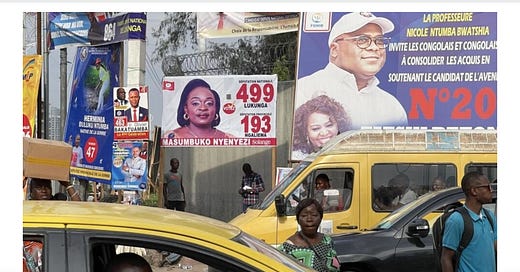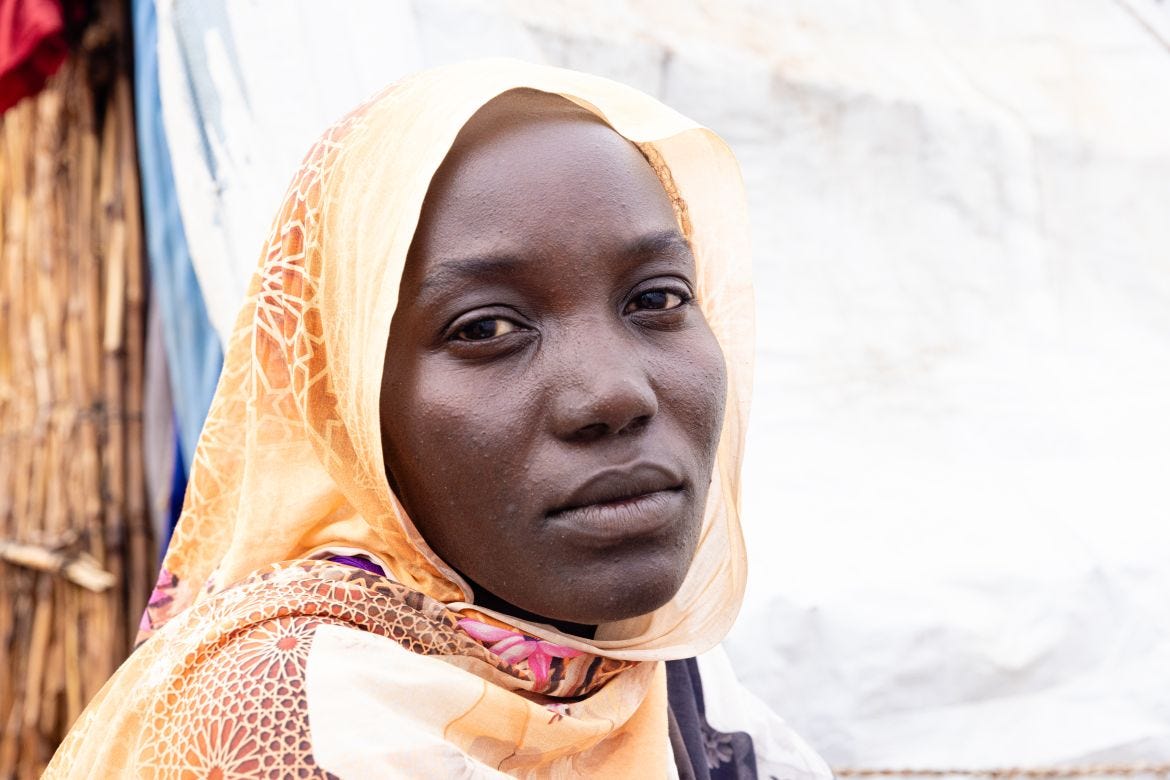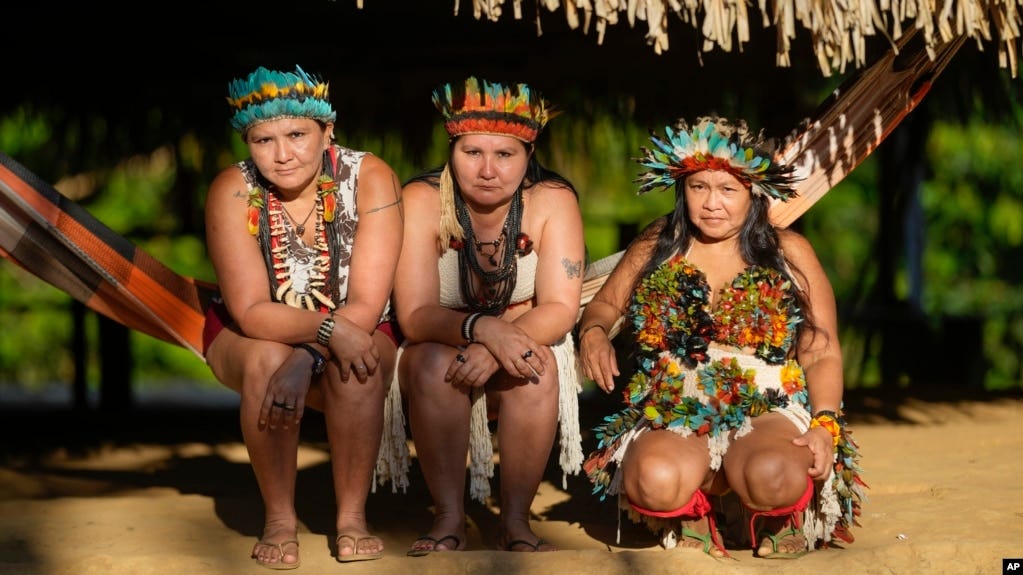Global Roundup: DRC Election & Women’s Rights, Sudanese Women in Chad Refugee Camp, Poland LGBTQ Couples, South Korea Queer Women, Indigenous Women Revive Amazon Tribe
Curated by FG Contributor Samiha Hossain
Candidate posters line the streets of Kinshasa. © David Gormezano, FRANCE 24
Ahead of Monday’s election in the Democratic Republic of Congo (DRC), women’s faces can be seen everywhere, pinned up on electoral posters throughout the country. During his five-year term, President Félix Tshisekedi demonstrated a commitment to women’s rights and better female representation in politics, but there is still a long way to go.
One of the advertisements, from the campaign of President Félix Tshisekedi, known colloquially as "Fatshi béton", highlights one of his flagship policies: free maternity care. Since being implemented in September 2023, the measure is gradually taking effect in public hospitals and health centres. For doctors, the free care provided to mothers and their babies can mean the difference between the life and death of their patients.
Often, women would refuse C-sections because they couldn't afford them. With the free service, maternal mortality has decreased. Today, we can intervene quickly. We no longer worry about whether a woman can pay. Infant mortality has also decreased. -Olenga Manga, medical intern
However, there are mixed opinions as to whether the policy is truly effective and whether the government’s promises are empty. After just three months, it is difficult to determine the status of the ambitious program. While several institutions in the capital city Kinshasa have implemented the initiative, few data are available to assess the DRC at large, with its more than 100 million inhabitants.
In Kinshasa, in the offices of the Jema'h Association, an organisation that promotes women’s rights through access to education and the labour market, a group of young girls record a podcast about the dangers of social media. For Tolsaint Vangu, 23, the project is about "influencing women who are ignorant of their rights, their duties, telling them about what they can do with their lives…" Marie-Joséphine Ntshaykolo, who led the Carter Center program which funded the creation of the recording studio, says there has been "significant progress" in women’s rights in the DRC. She does say, however, that the women's conditions vary by province or whether they live in cities or rural areas.
The obstacles to women's emancipation, especially in public affairs, are primarily cultural. In Congo, there is generally male domination. Women are discriminated against due to customs, norms that are not favourable to them. But there are more and more women candidates at the legislative level. In the government, there are more women. -Marie-Joséphine Ntshaykolo
Someya was a henna artist in Western Darfur, after her father was killed in a mosque, she crossed the border to Chad on foot with her three small children [Alyona Synenko/ICRC]
A spontaneous settlement in Adré, a Chadian border town of 12,000 inhabitants, has become a makeshift home to more than 100,000 Sudanese refugees. Almost 90 percent are women and children who crossed the border on foot, fleeing brutal violence that submerged their native Darfur soon after the conflict broke out in Sudan on April 15.
Kaltuma, a small woman with deep wrinkles and cloudy cataract eyes, had to summon all her strength to build her hut. She shares it with her two granddaughters, aged three and five. Kaltuma’s daughter took her two other children and left in search of daily work in the agricultural fields out of town. Every morning, Kaltuma tours Adré’s neighbourhoods, knocking on doors and asking people for food. Whatever she collects on a given day, she uses it to prepare a meal for herself and her granddaughters.
The residents of Adré have welcomed refugees, but Chad is one of the poorest countries in the world, and resources are scarce. Following the sharp increase in the population, food prices skyrocketed, and essential services like water and healthcare, which were in short supply even before the influx of refugees, came under enormous stress.
Someya, a henna artist, was pregnant when she fled her village in Western Darfur with her children after her father was killed in the mosque. She tried working at a construction site, but it was physically hard, and they wouldn’t let her breastfeed the baby, she says. Now, she does laundry in people’s houses. Someya says the family had a good life and enough food back in Darfur. The reality of the camp is different, and at one point, the new mother lost milk because she was not eating enough.
I don’t know what I want to do. Life in the camp is tough, but I have nothing to return to. My house burned down. I lost everything I owned. Even if I could return, I would have to start life from scratch. It is not easy. -Someya
People attend the "Equality Parade" rally in support of the LGBT community, in Warsaw, Poland June 19, 2021. The writing reads: "People, not ideology". REUTERS/Kacper Pempel/File Photo
Tusk said during campaigning that his party would introduce a provision for same-sex civil partnerships and he considered it a priority, a stance echoed by Equality Minister Katarzyna Kotula after the December 12th decision by the European Court of Human Rights (ECHR).
As well as adding momentum towards civil unions legislation, LGBTQ+ Poles said they hoped the ruling could boost their demands for equal marriage rights.
We hope that it will set in motion a whole avalanche of good changes in Poland. -Krzysztof Alcer & Grzegorz Lepianka, one of the five same-sex couples who took the case to the ECHR
Poland is one of only six countries in the 27-member European Union that offers no legal recognition for same-sex partnerships – whether through gay marriage laws or civil union legislation. That means gay couples are denied rights such as inheritance even if they have lived together for years, and are deprived of tax benefits. Laws recognising cohabitation offer them some limited legal protections, for example in tenancy agreements. During its eight-year rule, the nationalist Law and Justice (PiS) party said extending marriage and adoption to gay couples threatened traditional family structures and was harmful for children.
Rulings by the ECHR are binding on members of the Council of Europe, an organisation separate from the European Union, but some remain outstanding for years. The court has already ruled in similar cases brought against Italy, Russia, Romania and Bulgaria that same-sex couples can demand legal safeguards for their relationships. While Italy introduced civil unions shortly after, the other countries have failed to respect the judgment.
Photos By Kanghyuk Lee
Queer women shared with VICE how they cope with everyday life in conservative South Korea. Despite recent strides, many LGBTQ people are still struggling to find a community where they feel like they can be themselves. With less representation in public and the media, queer women, in particular, are finding it difficult to meet their peers they can talk to freely and openly.
Kim Ha-na, who is 26 and identifies as pansexual, was going through this very dilemma – until she was invited to a private house party for queer women by her queer friend. At the party, held for the first time last December, Ha-na drew Christmas trees and played recreational games with other participants, who were either friends or friends of friends. Ha-na said she met her “chosen family” that night. She, along with the others, endeavored to make sure the house party wasn’t just a one-off.
The women held two more parties in March and June and around eight people showed up to each of them. The community wasn’t a grand vision. It happened organically because the women can relate with others who have similar perspectives.
From our favorite porn and lesbian clubs to gossip, veganism, and BDSM, we talk to one another comfortably about all types of topics, including taboos like sex. -Kim Ha-na
The parties are also a venue where they can freely express themselves through what they wear. Their dress code is “embarrassing costume,” which refers to clothes they like but wouldn’t wear daily for fear of judgment. Ha-na thinks women feel at home at the parties because they don’t have to worry about people questioning their existence and judging their looks.
Everyone is on the same page that these [taboo topics such as LGBTQ and sexuality] don’t have to be hidden and should be brought out. Just sharing my thoughts with like-minded people gives me confidence and helps me feel solidarity and a strong bond. -Anonymous member
Ha-na said that being a woman in the country is already challenging due to the prevailing misogyny, but when you add queerness to the equation, the intensity of hatred as well as sexualization, it escalates even further. The women added that while the gay community in Korea is active with a larger online forum, more mobile applications, and bars and nightclubs, the lesbian community is not. Ha-na is hoping to keep these queer parties going and make them even bigger.
Juma Indigenous sisters Mandei Juma, from left, Mayta Juma and Borea Juma pose for a picture at their community, near Canutama, Amazonas state, Brazil, Sunday, July 9, 2023. (AP Photo/Andre Penner)
The Juma are native people of the Amazon rainforest area in Brazil. In the 1990s, there were only four people remaining in the tribe. They were Aruká, the father, and his three daughters – Boreá, Mandeí and Maytá.
In 2021, Aruká died from COVID-19. The tribe, in the past, was built upon the idea that men had to be in charge. Once the last man died, the tribe would become extinct. But the daughters had a different idea. Before Aruká died, he and his daughters started thinking about a way to keep the tribe alive by choosing a female leader. Mandeí said her sisters and father wanted her to take the position. So, Mandeí became the first woman chief in the area.
Mandeí recently retired as leader. Her older sister, Boreá, is chief now. Mandeí said she found leadership difficult, at first. She said other people did not treat the Juma with respect because the tribe was so small. People also opposed her leadership because she is female, she said. It hurt her but did not stop her.
The Juma territory needs a strong leader. It is about the size of a large city, similar to Las Vegas, Nevada. Old-growth forest covers the land. A Juma leader’s main job is to protect the territory and its natural wealth from outsiders. People come and cut down the trees. They then use the cleared land to plant grasses that are used to raise animals. The changes are damaging to the traditional life of native people.
When Mandeí became the leader, she asked for help in saving the Juma language. In 2019, she invited a language expert to visit and help create a dictionary for use with mobile phones. They also created digital records of the language with stories, speeches, and songs in the Juma language. Mandeí said she is concerned that the language and the people who speak it will disappear one day. There are only 24 people living in the Juma village. The three sisters are still trying to decide how to pass down the Juma traditions to the people who come after them.
Samiha Hossain (she/her) is an aspiring urban planner studying at Toronto Metropolitan University. Throughout the years, she has worked in nonprofits with survivors of sexual violence and youth. Samiha firmly believes in the power of connecting with people and listening to their stories to create solidarity and heal as a community. She loves learning about the diverse forms of feminist resistance around the world.








